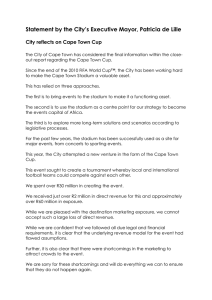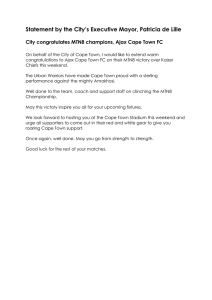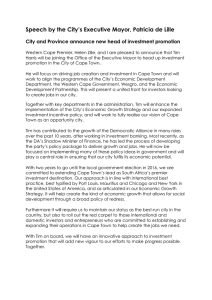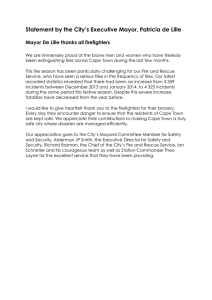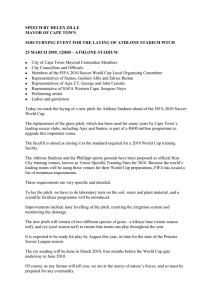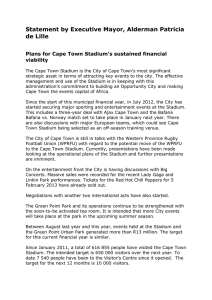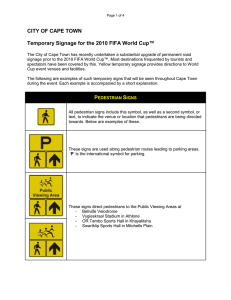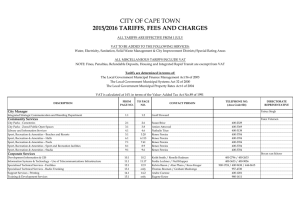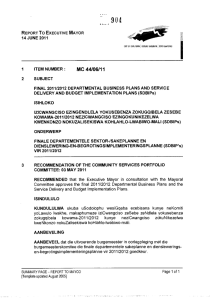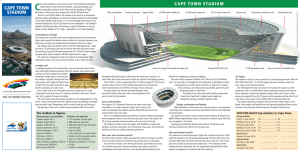Speech by the City’s Executive Mayor, Alderman Patricia
advertisement
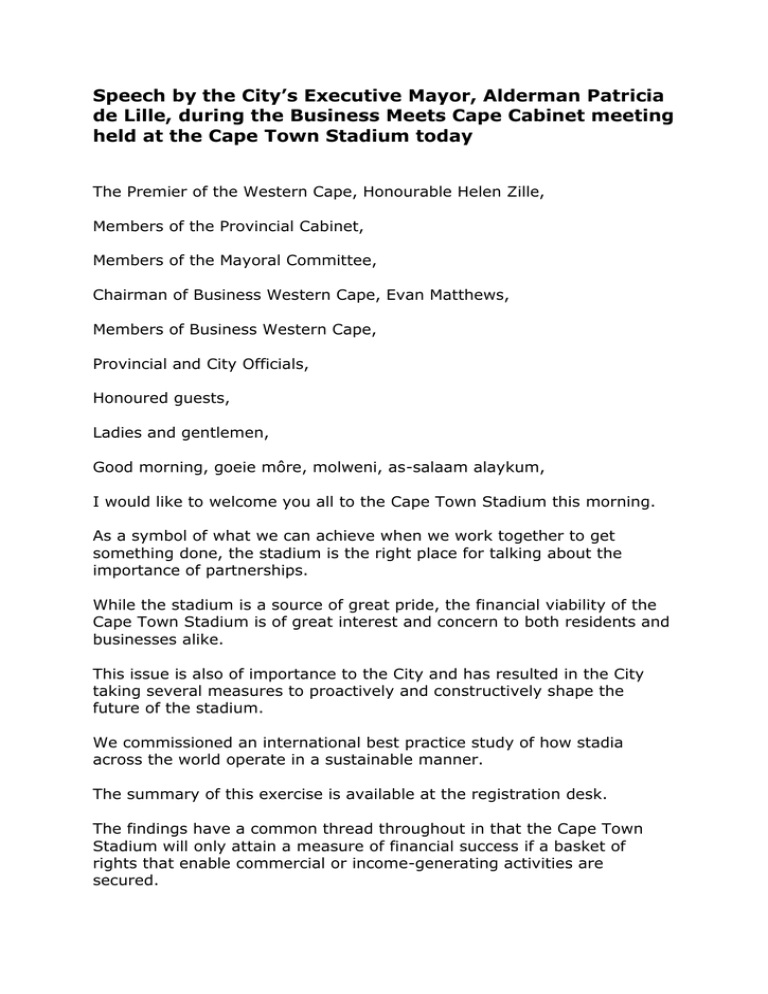
Speech by the City’s Executive Mayor, Alderman Patricia de Lille, during the Business Meets Cape Cabinet meeting held at the Cape Town Stadium today The Premier of the Western Cape, Honourable Helen Zille, Members of the Provincial Cabinet, Members of the Mayoral Committee, Chairman of Business Western Cape, Evan Matthews, Members of Business Western Cape, Provincial and City Officials, Honoured guests, Ladies and gentlemen, Good morning, goeie môre, molweni, as-salaam alaykum, I would like to welcome you all to the Cape Town Stadium this morning. As a symbol of what we can achieve when we work together to get something done, the stadium is the right place for talking about the importance of partnerships. While the stadium is a source of great pride, the financial viability of the Cape Town Stadium is of great interest and concern to both residents and businesses alike. This issue is also of importance to the City and has resulted in the City taking several measures to proactively and constructively shape the future of the stadium. We commissioned an international best practice study of how stadia across the world operate in a sustainable manner. The summary of this exercise is available at the registration desk. The findings have a common thread throughout in that the Cape Town Stadium will only attain a measure of financial success if a basket of rights that enable commercial or income-generating activities are secured. This has given rise to two further processes that are currently underway: The first is an investigation to determine the most appropriate long-term management and operating structure for the stadium. Consultations with representatives of business and labour are imminent. Once completed, Council will be required to decide on the most viable management option including the future status of anchor tenants. Public consultation processes are built into the execution of this process. The second revolves around the granting of a set of land use rights that will enable the activation of several business and revenue-generating opportunities. Current provisions restrict such activities on non-event days. The City will embark on a process to attain a new environmental authorisation for the stadium in terms of the National Environmental Management Act (NEMA) and will apply for a new zoning provision in terms of the Land Use Planning Ordinance (LUPO). Again public consultation processes will be undertaken. The two processes mentioned herein are expected to be concluded by June 2015. But the purpose of today is a way of taking an important partnership forward. The fact is that both government and the private sector have equally important roles to play in making our society function and our country work. Government, in its various forms, is the custodian of public will at the level of policy and intent. The private sector creates the conditions in which those policies can be expressed and fund how they are articulated. The relationship is so complex, the ties that bind us so reinforcing, that it is difficult to separate each other and see ourselves as sole actors. But that does not mean there is one joint force expressing one opinion and acting with a single intent. That would be unhealthy for democracy; it would be unhealthy for the market; and it would be unhealthy for the individual. Of course the private sector, business, and government disagree and have differing opinions on a wide range of issues. Of course we approach some problems differently and have different interests and hope for different outcomes. That constructive difference signifies our independence of each other and the nature of the constituencies and interests that we serve. But just because we are independent, just because we have constructive differences – these things do not mean that we cannot treat each other honestly and openly and explore new ways to further both of our interests. Because when we find common ground, we find a space in which we can create opportunities for everyone. That is the point of the partnership I am interrogating. And while it may be strained elsewhere in South Africa, in the Western Cape it is going from strength to strength. In the city region, we have made economic growth and the creation of the enabling environment for investment and job creation our highest aim. That is why we invest so much in infrastructure, to try and stimulate the crowding-in effect for private investment. It is why we have invested so much in public transport, to create economic movement. And it is why we are investing so much in broadband, to create the modern Information and Communication Technology infrastructure that supports 21st Century economies. This is in addition to the provision of the highest level of service delivery in the country that provides the basic infrastructure that supports economic growth – such as provision of electricity, water and roads. These things are sometimes taken for granted by some but their absence makes business activity all but impossible. We are committed to furthering our relationship with business, and in building our partnership, our doors are always open. In conclusion, let me remind you that we do not believe that government has all of the answers. We are trying to find ways to address common challenges, both old and new. In order to do so, we have to come together and find out what we can do to assist one another – whether by creating the right economic climate or by sharing innovative solutions based on our different experiences. And we should never take each other for granted. I welcome you again today and wish you fruitful deliberations with our officials and our colleagues in the Western Cape Government. Thank you, baie dankie, enkosi.
